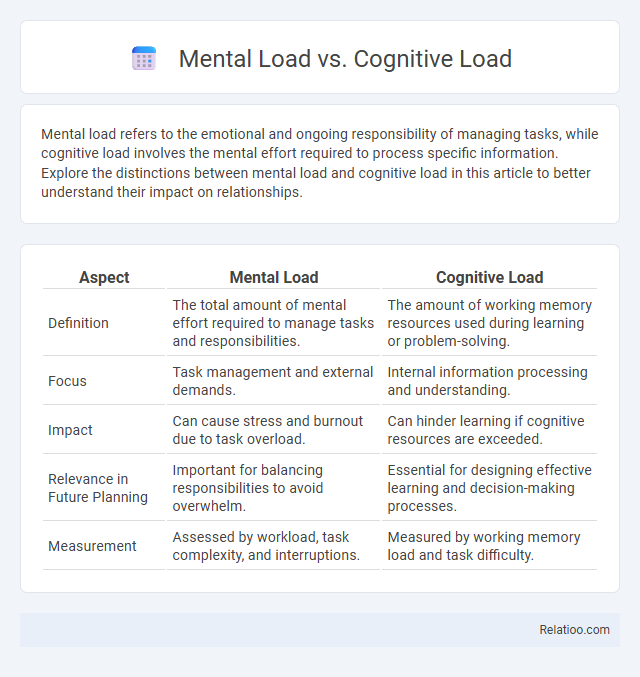Mental load refers to the emotional and ongoing responsibility of managing tasks, while cognitive load involves the mental effort required to process specific information. Explore the distinctions between mental load and cognitive load in this article to better understand their impact on relationships.
Table of Comparison
| Aspect | Mental Load | Cognitive Load |
|---|---|---|
| Definition | The total amount of mental effort required to manage tasks and responsibilities. | The amount of working memory resources used during learning or problem-solving. |
| Focus | Task management and external demands. | Internal information processing and understanding. |
| Impact | Can cause stress and burnout due to task overload. | Can hinder learning if cognitive resources are exceeded. |
| Relevance in Future Planning | Important for balancing responsibilities to avoid overwhelm. | Essential for designing effective learning and decision-making processes. |
| Measurement | Assessed by workload, task complexity, and interruptions. | Measured by working memory load and task difficulty. |
Understanding Mental Load: Definition and Examples
Mental load refers to the continuous mental effort required to manage everyday tasks, including planning, organizing, and decision-making, often experienced in household and work environments. Cognitive load involves the mental resources used in processing information during learning or problem-solving activities, divided into intrinsic, extraneous, and germane loads. Understanding mental load highlights the invisible burden of multitasking and managing responsibilities, which can lead to stress and diminished productivity if unbalanced.
What Is Cognitive Load? A Clear Explanation
Cognitive load refers to the total amount of mental effort being used in the working memory during information processing. It is distinct from mental load, which involves the overall burden of tasks and responsibilities, and mental workload, which includes both cognitive and physical demands of a task. Understanding cognitive load helps optimize learning and productivity by managing how much information the brain can handle at once without becoming overwhelmed.
Key Differences Between Mental Load and Cognitive Load
Mental load refers to the ongoing responsibility of managing tasks, schedules, and responsibilities that require mental organization and planning, often linked to stress and emotional burden. Cognitive load involves the amount of mental effort used in working memory during learning or problem-solving tasks, focusing on processing capacity and information retention. Key differences lie in mental load's emphasis on continuous task management and emotional strain, while cognitive load centers on mental capacity limitations affecting performance and comprehension.
Types of Mental Load in Daily Life
Mental load in daily life encompasses emotional, organizational, and decision-making burdens that require constant mental effort to manage household tasks, schedules, and social responsibilities. Cognitive load involves the process of working memory handling information processing and problem-solving tasks, which can be intrinsic, extraneous, or germane based on the task complexity. Understanding these distinctions helps optimize mental health by reducing overwhelm through task delegation, prioritization, and effective time management strategies.
Types of Cognitive Load: Intrinsic, Extraneous, Germane
Cognitive load is divided into three types: intrinsic, extraneous, and germane. Intrinsic load relates to the complexity of the material you are learning, which requires your mental effort to process. Extraneous load involves unnecessary distractions that do not support learning, while germane load focuses on the effort dedicated to creating schemas and understanding, optimizing your mental resources.
Mental Load in Workplace and Home Environments
Mental load refers to the constant mental effort required to manage and organize tasks, especially in workplace and home environments where You juggle multiple responsibilities such as scheduling, decision-making, and problem-solving. Cognitive load, by contrast, pertains to the processing capacity of Your working memory when handling complex tasks, while emotional load involves the stress and emotional demands impacting Your mental well-being. Understanding and balancing mental load in both personal and professional settings is crucial for maintaining productivity and reducing burnout.
Cognitive Load Theory: Principles and Applications
Cognitive Load Theory (CLT) emphasizes managing working memory constraints to enhance learning efficiency by optimizing intrinsic, extraneous, and germane cognitive loads. Mental load refers broadly to the total burden on a person's cognitive resources, while mental workload encompasses task demands and contextual factors influencing mental effort. Applying CLT principles in instructional design reduces unnecessary cognitive load, fostering better knowledge acquisition and retention.
How Mental and Cognitive Load Affect Productivity
Mental load refers to the continuous responsibility of managing tasks and information, while cognitive load pertains to the mental effort required to process specific information or solve problems. High mental load can lead to stress and overwhelm, reducing focus and decision-making capacity, whereas excessive cognitive load impairs working memory, slowing task completion and increasing errors. Both types of load negatively impact productivity by exhausting mental resources needed for efficient problem-solving and task management.
Strategies to Manage and Reduce Mental Load
Strategies to manage and reduce mental load include prioritizing tasks, breaking complex activities into smaller steps, and using tools like planners or digital apps to organize schedules efficiently. Mindfulness practices and regular breaks help alleviate cognitive fatigue, enhancing focus and decision-making. By implementing these techniques, you can minimize mental overload and improve overall cognitive performance.
Optimizing Cognitive Load for Better Learning and Performance
Optimizing cognitive load involves balancing intrinsic, extraneous, and germane load to enhance learning efficiency and performance outcomes. Mental load pertains to the overall mental effort from multitasking and environmental demands, while cognitive load specifically addresses the processing capacity required for learning tasks. Reducing extraneous cognitive load through clear instructions and streamlined information presentation maximizes working memory resources, improving knowledge retention and task execution.

Infographic: Mental Load vs Cognitive Load
 relatioo.com
relatioo.com